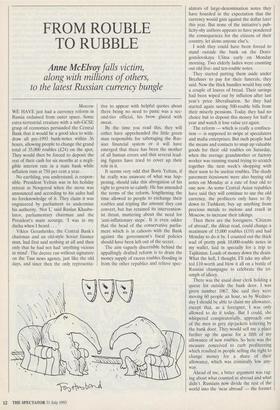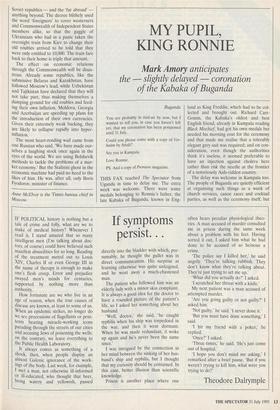FROM ROUBLE TO RUBBLE
Anne McElvoy falls victim,
along with millions of others, to the latest Russian currency bungle
Moscow WE HAVE just had a currency reform in Russia ordained from outer space. Some extra-terrestrial creature with a sub-GCSE grasp of economics persuaded the Central Bank that it would be a good idea to with- draw all pre-1993 bank-notes within 36 hours, allowing people to change the grand total of 35,000 roubles (£24) on the spot. They would then be forced to deposit the rest of their cash for six months at a negli- gible interest rate in a state bank while inflation runs at 750 per cent a year.
No earthling, you understand, is respon- sible. President Yeltsin was in his holiday retreat in Novgorod when the move was announced and according to his aides had no foreknowledge of it. They claim it was engineered by parliament to undermine his authority. 'Not I,' said Ruslan Khasbu- latov, parliamentary chairman and the President's main scourge, 'I was in my dacha when I heard . . . '
Viktor Gerashenko, the Central Bank's chairman and an old-style Soviet finance man, had first said nothing at all and then only that he had not had 'anything vicious in mind'. The decree ran without signature on the Tass news agency, just like the old days, and since then the only representa- tive to appear with helpful quotes about there being no need to panic was a sec- ond-tier official, his brow glazed with sweat.
By the time you read this, they will either have apprehended the little green man responsible for sabotaging the Rus- sian financial system or it will have emerged that there has been the mother of all human errors and that several lead- ing figures have tried to cover up their role in it.
It seems very odd that Boris Yeltsin, if he really was unaware of what was hap- pening, should take this abrogation of his right to govern so calmly. He has amended the terms of the reform, lengthening the time allowed to people to exchange their roubles and tripling the amount they can convert, but has retained its intervention- ist thrust, muttering about the need for `anti-inflationary steps'. It is even odder that the head of the conservative parlia- ment which is in cahoots with the Bank against the government's fiscal policies should have been left out of the secret.
The aim vaguely discernible behind the appallingly drafted reform is to drain the money supply of excess roubles flooding in from the other republics and relieve spec-
ulators of large-denomination notes they have hoarded in the expectation that the currency would gain against the dollar later this year. But none of the initiative's pub- licity-shy authors appears to have pondered the consequences for the citizens of their country, let alone anyone else's.
I wish they could have been forced to stand outside the bank on the Doro- gomilovskaya Ulitsa early on Monday morning. Two elderly ladies were counting out old five- and ten-rouble notes.
They started putting them aside under Brezhnev to pay for their funerals, they said. Now the thick bundles would buy only a couple of loaves of bread. Their savings had been wiped out by inflation after last year's price liberalisation. So they had started again saving 500-rouble bills from their miserly pensions. Today they had no choice but to deposit this money for half a year and watch it lose value yet again.
The reform — which is really a confisca- tion — is supposed to swipe at speculators and mafia enterprises. But such people had the means and contacts to snap up valuable goods for their old roubles on Saturday, when the average grandmother or factory worker was running round trying to scratch together the next week's shopping with their soon to be useless roubles. The shady pavement biznismeni were also buying old notes on Monday at a rate of four old to one new. As some Central Asian republics have said they will continue to use the old currency, the profiteers only have to fly down to Tashkent, buy up anything from precious metals to melons and resell in Moscow, to increase their takings.
Then there are the foreigners. 'Citizens of abroad', the diktat read, could change a maximum of 15,000 roubles (£10) and had Monday to do it by. I counted out the thick wad of pretty pink 10,000-rouble notes in my wallet, laid in specially for a trip to Tajikistan. Loads of money down the drain. What the hell, I thought, I'll take my allot- ted £10-worth and blow it all on a bottle of Russian champagne to celebrate the tri- umph of idiocy.
There was the usual dour clerk holding a queue list outside the bank door. I was given number 1067. She said they were moving 60 people an hour, so by Wednes- day I should be able to claim my allowance, except that, as a foreigner, I was only allowed to do it today. But I could, she whispered conspiratorially, approach one of the men in grey zip-jackets loitering by the bank door. They would sell me a place further up the queue for a fifth of my allowance of new roubles. So here was the measure conceived to curb profiteering which resulted in people selling the right to change money for a share of their allowance, which was criminally low any- way.
Ahead of me, a bitter argument was rag- ing about what counted as abroad and what didn't. Russians now divide the rest of the world into the 'near abroad' — the former Soviet republics — and the 'far abroad' anything beyond. The decree blithely used the word 'foreigners' to cover westerners and Commonwealth of Independent States members alike, so that the gaggle of Ukrainians who had in a panic taken the overnight train from Kiev to change their old roubles arrived to be told that they were only entitled to 10,000. The train fare back to their home is triple that amount.
The effect on economic relations through the Commonwealth will be disas- trous. Already some republics, like the submissive Belarus and Kazakhstan, have followed Moscow's lead, while Uzbekistan and Tajikistan have declared that they will not take part, thus making themselves a dumping ground for old roubles and feed- ing their own inflation. Moldova, Georgia and Azerbaijan are speeding up plans for the introduction of their own currencies. Given their extremely weak backing, they are likely to collapse rapidly into hyper- inflation.
The most heart-rending wail came from one Russian who said, 'We have made our- selves a laughing stock once again in the eyes of the world. We are using Bolshevik methods to tackle the problems of a mar- ket economy.' But the Stalinist ghost in the economic machine had paid no heed to the likes of him. He was, after all, only Boris Fyodorov, minister of finance.
Anne McElvoy is the Times bureau chief in Moscow.



















































 Previous page
Previous page